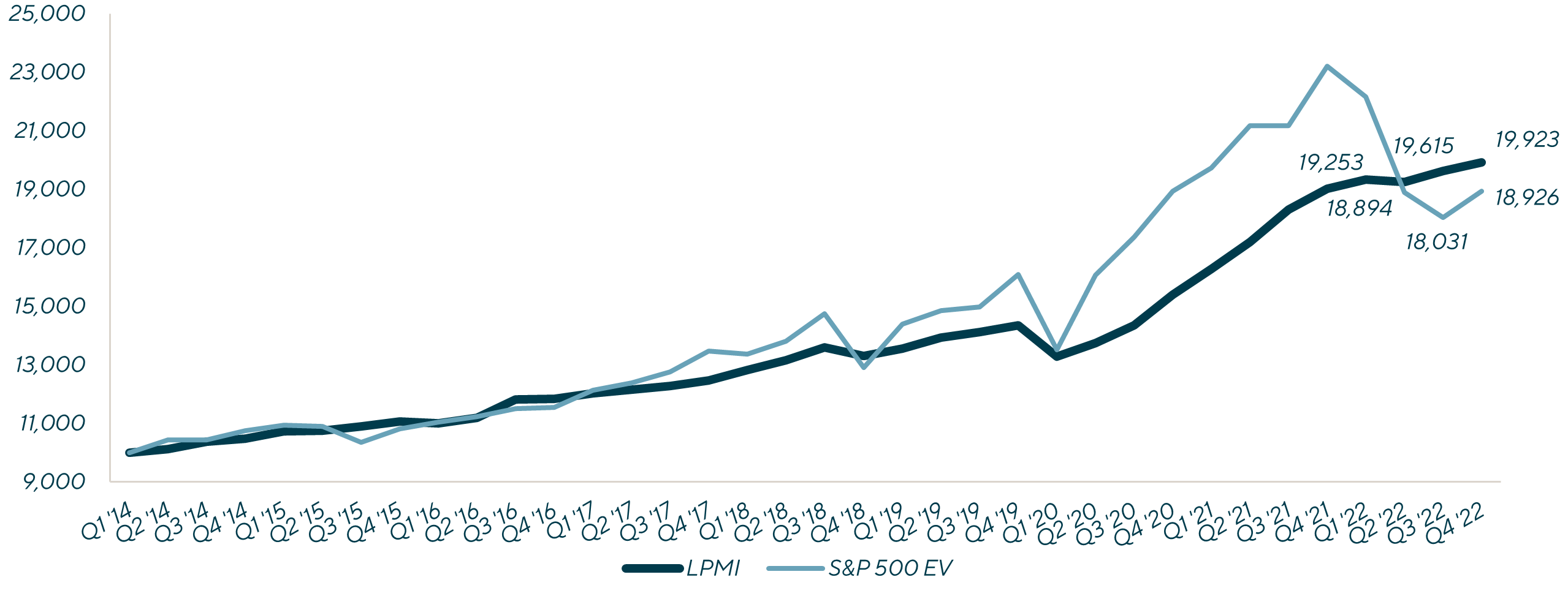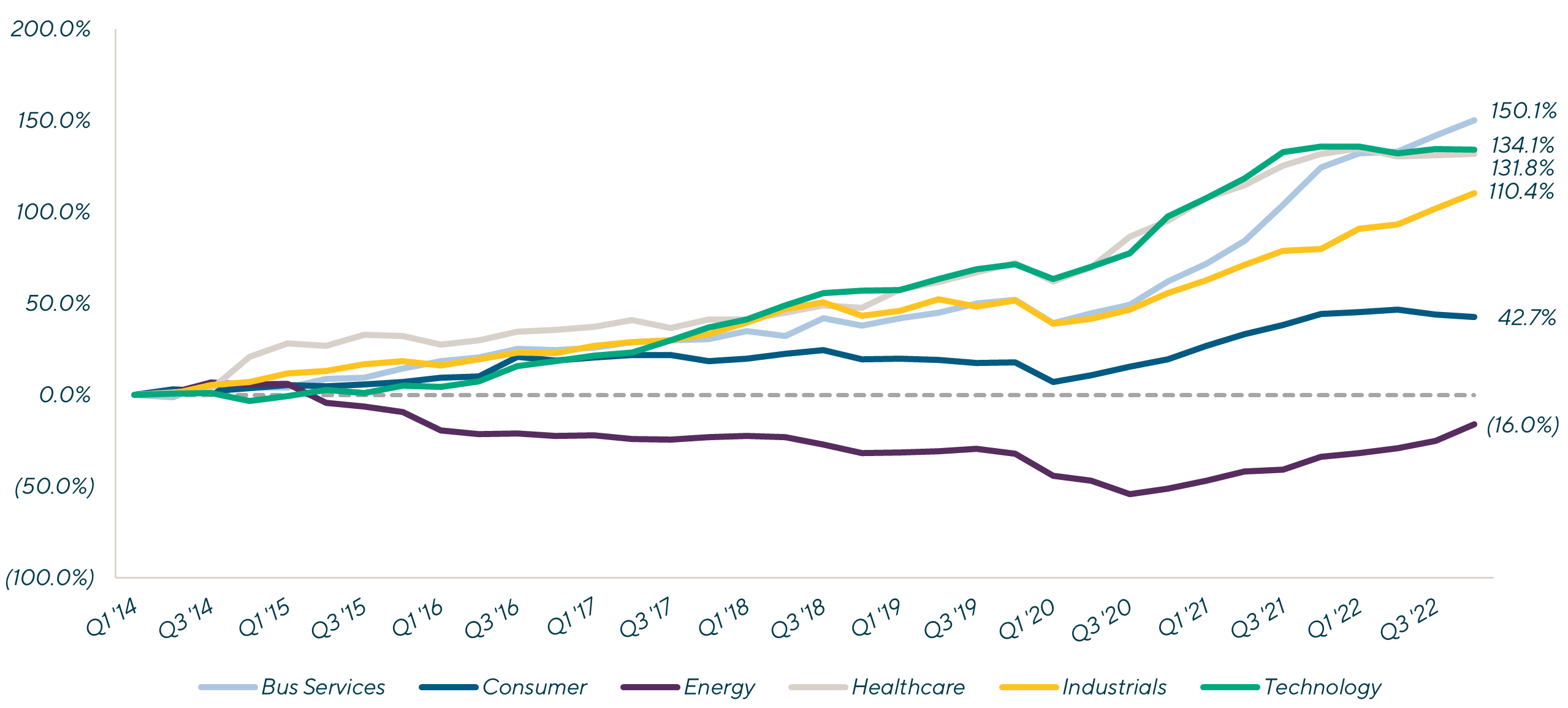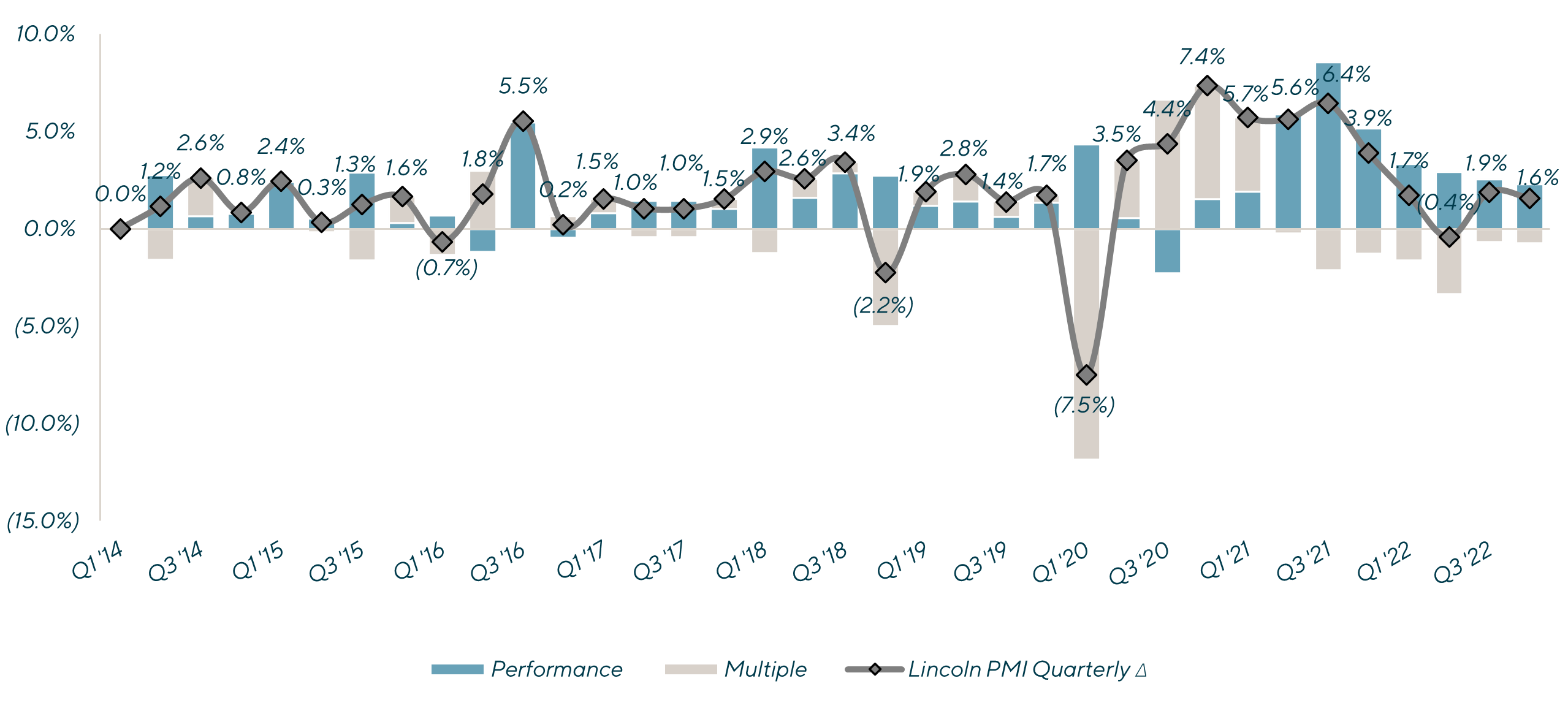Results
Private Markets Remain Insulated Amidst Public Market Volatility
 (NOTE: Both the LPMI and S&P 500 EV returns above reflect enterprise values)
(NOTE: Both the LPMI and S&P 500 EV returns above reflect enterprise values)
(S&P 500 EV excludes financial companies for which enterprise value is generally not meaningful; however, including such companies produces similar results)
| Q4 ’22 | 2022 | |
| Lincoln PMI | 1.6% | 4.8% |
| S&P 500 EV | 5.0% | (18.4%) |
| LPMI Equity | 2.8% | 6.4% |
| S&P 500 | 7.1% | (19.4%) |
Sector Breakdown
Consumer Valuations Declined While Other Industries Saw Flat-to-Modest Growth

| Industry | Q4 ’22 | 2022 |
| Bus Services | 3.3% | 11.5% |
| Consumer | (0.9%) | (1.2%) |
| Energy | 12.0% | 27.1% |
| Healthcare | 0.3% | 0.0% |
| Industrials | 4.2% | 16.9% |
| Technology | (0.1%) | (0.8%) |
Examining the Lincoln PMI
EBITDA Multiples Versus Earnings

| ~35%+ |
| Expansion of LPMI valuation multiples since Q1 2014 |
Summary
The Lincoln PMI
General Observations
- Private company EVs increased for the second consecutive quarter as the LPMI increased 1.6%. The index has increased 38.8% from pre-pandemic levels observed in Q4 2019 but growth has slowed for over a year.
- Despite similar directional growth in 2021, the LPMI and S&P 500 EV experienced diverging performance in early 2022 before reconverging in Q4 2022. The differences were a result of more volatile multiples seen throughout 2022 in the S&P 500 EV relative to the LPMI.
- Since its inception in Q1 2014, the LPMI has shown that private company EV multiples have been less volatile than public company multiples and that earnings are the primary factor driving long term value creation.
Enterprise Value Results
- In Q4 2022, private market valuations continued to hinge on companies’ ability to pass on price increases or find alternative ways to mitigate cost increases; while the story of 2022 was one of margin declines, EBITDA still grew approximately 9% year-over-year.
- Investors are expected to remain selective and focused recession-resilient companies in 2023, which may lead to a buildup of deployable capital in the back half of 2023. If investors look to deploy the built up capital in the second half of 2023, the private market may be able to sustain the recent level of EV multiples, which could stabilize EV in 2023 should operating performance finally soften.
- In Q4 2022, both the LPMI and S&P 500 EV indices increased, although for different reasons. The LPMI benefitted from improved operating results, whereas the S&P 500 index benefitted from multiple expansion.
Industry Breakdown on an enterprise value basis
- Despite ongoing volatility and multiple compression in the public markets, the consumer industry was the only industry within the LPMI to undergo a notable decline in the current quarter, which was a result of the inability to fully pass on price increases and concerns on the duration of the ongoing headwinds.
- In the current quarter, private company valuations for business services and industrials industries continued to increase, given the greater ability to pass on price increases to customers.
In Summary, we believe the Lincoln PMI
|
Methodology
Source of Data and Sample Size
On a quarterly basis, Lincoln determines the enterprise fair value of over 4,000 portfolio companies for over 125 sponsors (i.e., PE groups and lenders to PE groups). These portfolio companies report quarterly financial results to the sponsor or lender. Lincoln obtains this information and determines the appropriate EV multiple so as to compute the EV in accordance with the fair value measurement principles of generally accepted accounting principles. In assessing EV, Lincoln relies on well accepted valuation methodologies such as the market approach and income approach considering each company’s historical and projected performance and other qualitative and quantitative factors. Finally, each valuation is then vetted by auditors, company management, boards of directors and regulators. Upon concluding each quarterly valuation cycle, Lincoln aggregates the underlying financial performance and EV data for analysis.
To construct the LPMI, Lincoln selects a subsection of the companies valued each quarter, including private companies each generating earnings before interest, taxes, depreciation and amortization of less than $100.0 million, disregarding venture-stage businesses and non-operating entities, such as special purpose entities that own real estate and specialty finance assets.
For more information, visit www.lincolninternational.com/services/valuations-and-opinions/lincolnpmi
| 4,000 Portfolio companies are evaluated by Lincoln on a quarterly basis to determine their Enterprise Fair Value |
125+ Sponsors participate in LPMI i.e. private equity groups & lenders to private equity groups |
Academic Advisors
Professor Steven Kaplan
Professor Steven Kaplan is a Senior Advisor to Lincoln’s Valuations and Opinions Group. He is the Neubauer Family Distinguished Service Professor of Entrepreneurship and Finance and Kessenich E.P. Faculty Director at the Polsky Center for Entrepreneurship and Innovation at the University of Chicago Booth School of Business. Among other courses, Professor Kaplan teaches advanced Master of Business Administration and executive courses in entrepreneurial finance and PE, corporate finance, corporate governance and wealth management. Professor Kaplan conducts research on a wide array of issues in PE, venture capital, corporate governance, boards of directors, mergers and acquisitions and corporate finance. He has been a member of the Chicago Booth faculty since 1988.
Professor Kaplan serves on the board of Morningstar and several fund and company advisory boards. He is also a Research Associate at the National Bureau of Economic Research and an Associate Editor of the Journal of Financial Economics.
Professor Kaplan received a Bachelor of Arts, summa cum laude, in applied mathematics and economics from Harvard College and earned a Doctor of Philosophy in business economics from Harvard University.
Professor Michael Minnis
Professor Michael Minnis is a Senior Advisor to Lincoln’s Valuations and Opinions Group. He is a Professor of Accounting at the University of Chicago Booth School of Business, where he researches the role of accounting information in allocating investment efficiently by both managers and capital providers. His recent research focuses on understanding the role of privately held companies in the U.S. economy and how these firms use financial reporting to access, deploy and manage capital. He particularly enjoys identifying unique data and methods to empirically examine issues in a novel way.
In January 2018, Professor Minnis became a member of the Private Company Council, the primary advisory council to the Financial Accounting Standards Board (FASB) on private company issues. Professor Minnis received his Ph.D. from the University of Michigan and his Bachelor of Science from the University of Illinois, where he graduated with highest honors.
Meet Our Senior Team

I find immense fulfillment in enabling clients to achieve their objectives and navigate the complexities of today's ever-changing landscape.
Chris Croft
Managing Director & Co-head of Transaction Opinions
New York
I enjoy sharing insights about market and valuation trends with my clients, while also leading a differentiated and high-touch process.
Brian Garfield
Managing Director & Head of U.S. Portfolio Valuations
New York
I enhance my clients’ decision making and governance processes by providing independent and objective financial advice in a highly responsive manner.
Chris Gregory
Managing Director & Co-head of Transaction Opinions
New York
I enjoy the opportunity to provide clients with insightful and unbiased advice that will help them make the most informed decisions possible.
Ron Kahn
Managing Director & Co-head of Valuations & Opinions
ChicagoRelated Perspectives
IMPORTANT DISCLOSURE: The Lincoln Private Market Index is an informational indicator only, and does not constitute investment advice or an offer to sell or a solicitation to buy any security. It is not possible to directly invest in the Lincoln Private Market Index. Some of the statements above contain opinions based upon certain assumptions regarding the data used to create the Lincoln Private Market Index, and these opinions and assumptions may prove incorrect. Actual results could vary materially from those implied or expressed in such statements for any reason. The Lincoln Private Market Index has been created on the basis of information provided by third-party sources that are believed to be reliable, but Lincoln International has not conducted an independent verification of such information. Lincoln International makes no warranty or representation as to the accuracy or completeness of such third-party information.
The LPMI should not be construed as an offer to sell or buy, or a solicitation to sell or buy, any products linked to the performance of the LPMI. The use of the LPMI in any manner, including for benchmarking purposes, is not endorsed or recommended by Lincoln International and Lincoln International is not responsible for any use made of the LPMI. Lincoln International does not guarantee the accuracy and/or completeness of the LPMI and Lincoln International shall not have any liability for any errors or omissions therein. None of Lincoln International, any of its affiliates or subsidiaries, nor any of its directors, officers, employees, representatives, delegates or agents shall have any responsibility to any person (whether as a result of negligence or otherwise) for any determination made or anything done (or omitted to be determined or done) in respect of the LPMI and any use to which any person may put the LPMI. Lincoln International has no obligation to update the LPMI and has no obligation to investors with respect to any product based on the performance of the LPMI. Any investment in such a product will not acquire an interest in the LPMI. Lincoln International is not an investment adviser and will not provide any financial advice relating to a product linked to the performance of the LPMI. Investors should read any such product offering documentation and consult with their own legal, financial and tax advisors before investing in any such product.
Q4 2022 Lincoln Private Market Index
Lincoln Private Market Index Grows Modestly in Q4 2022 Amid Public Market Volatility Lincoln International’s 22nd edition of the Lincoln PMI (LPMI) reveals that in Q4 2022, private market enterprise… Read More

Cybersecurity Report: Q4 2022
Cybersecurity mergers and acquisitions (M&A) and investment activity levels and values remained healthy in 2022, despite macro headwinds and public market declines. We expect strategic, investor and customer demand for… Read More

Q4 2022 Lincoln Senior Debt Index
The LSDI returned 0.9% for the fourth quarter. This represented the one of the lowest quarterly returns since the inception of the LSDI which began in Q4 2014.

EMS Quarterly Review Q4 2022
The EMS industry demonstrated increased deal activity and resilience during Q4 2022, despite current recessionary pressures. The continued electronics “supercycle” growth and “interconnection of everything” is fueling further demand in… Read More

Facilities Services Market Update Q4 2022
Overall, we remain optimistic that the facilities services M&A market will remain strong in 2023 for both financial and strategic buyers.

Packaging Quarterly Review Q4 2022
The final quarter of 2022 closed the year out on the same note as previous quarters, with a continued cooling of market activity. The total number of closed mergers and… Read More

Food & Beverage Market Update Q3 2022
Turbulent public credit and equity markets influenced by heightened concerns over a near-term recession have cooled the mergers and acquisitions (M&A) market. The Fed’s focus on curbing inflation has dampened… Read More

Cybersecurity Report: Q3 2022
Q3 2022 cyber mergers and acquisitions (M&A) continue to demonstrate relative buoyancy. Year-to-date (YTD) Q3 2022 cybersecurity M&A volume of $25 billion, while a decline compared to 2021’s record of $49… Read More

Q3 2022 Lincoln Senior Debt Index
The LSDI returned 0.7% for Q3; essentially unchanged from Q2. This represented the fourth lowest return since the inception of the LSDI in Q4 2014.

Aerospace & Defense Market Update Q3 2022
Despite the challenges noted in the public markets, Lincoln International’s recent A&D deal activity and discussions indicate a general consensus that private market M&A deal activity and valuations have remained… Read More
Q3 2022 Lincoln Private Market Index
Lincoln Private Market Index Modestly Increases, but Private Markets are Beginning to Cool Off Lincoln International’s 21st edition of the Lincoln Private Market Index (Lincoln PMI) reveals that in Q3… Read More

Distribution Quarterly Review Q3 2022
Public markets and the overall economy faced the same headwinds as in prior periods, with price inflation remaining stubbornly high even as supply chain snarls began to ease, employment growth… Read More

Chemicals Quarterly Review Q3 2022
During Q3 2022, the global financial markets were battered. Performance continued to trend downward as a result of market volatility and geopolitical uncertainty. We believe that continued uncertainty will weigh… Read More

Education Technology & Services Market Update: Q3 2022
Unlike 2021, the education mergers and acquisitions (M&A) market in 2022 has seen some rather dramatic changes since January.

EMS Quarterly Review Q3 2022
Over the past few months, the EMS industry demonstrated increased deal activity and positive performance, despite the macroeconomic challenges and the current recessionary pressures stemming from supply chain delays, inflationary… Read More

Facilities Services Market Update Q3 2022
After a series of record-breaking quarters throughout 2021, Q3 2022 marks another slight deceleration in mergers and acquisitions (M&A) activity, approximately 7,500 deals closed, according to S&P Global. Overall, we remain… Read More

Packaging Quarterly Review Q3 2022
As packaging companies seek to build resilient business models, they should consider strengthening operations through the solidification of their supply chain and the identification of more niche pockets of opportunity… Read More

Q2 2022 Lincoln Senior Debt Index
Rising spreads and yields – the two primary risks in this asset class are interest rate risk and credit risk. For the quarter ending June 30, 2022, yields of the… Read More

Cybersecurity Report: Q2 2022
Q2 2022 cyber mergers and acquisitions (M&A) demonstrated relative buoyancy despite broader headwinds. Cyber sector continues to show robust growth prospects, as spending drivers remain powerful.

Food & Beverage Market Update Q2 2022
The second quarter remained busy across the industry, but at a more normalized level compared to the record pace of 2021.We expect continued strength in the food and beverage deal… Read More

Q2 2022 Lincoln Private Market Index
Private Company Enterprise Values Increased Again to New Record Highs in Q2 2022 Lincoln International’s 20th edition of the Lincoln Private Market Index (Lincoln PMI) reveals that in Q2 2022,… Read More

Chemicals Quarterly Review Q2 2022
In Q2 2022, deflated performance continued broadly across the chemicals and materials sector. The industry is cautiously optimistic on a recovery despite ongoing Eastern Europe conflict, continued supply chain woes… Read More

Education Technology & Services Market Update: Q2 2022
…We can only hope that COVID-19’s impact on education mergers and acquisitions (M&A) is a little more short lived, and that we can soon re-focus on the fundamentals of the… Read More

Distribution Quarterly Review Q2 2022
Markets started to face headwinds from macroeconomic concerns and continuing problems with international supply chains and shipping lanes, a disrupted domestic labor market and the ongoing war in Ukraine; these… Read More

EMS Quarterly Review Q2 2022
While public company valuations have not increased at pace with the broader market, recent private company valuations and market activity continue to demonstrate the strength of current mergers and acquisitions… Read More







